International technical support Newsletter No 19, December 2022
- Editorial
- Initial work on the implementation of the Pan-African Statistics Programme
- Statistical cooperation with the Central Bank of West African States (BCEAO): notable outcomes
- Regional reports on the SDGs: a visit by the High Commission for Planning of Morocco to the Île-de-France regional office
- Interview with Isabelle Kabla-Langlois, Regional Director
- Changes within the International Technical Support division team
- A summary of INSEE’s cooperation activities in the 2nd half of 2022
- Regional Activities
- Sub-Saharan Africa
- The Maghreb and Mediterranean Basin
Editorial
As announced in previous issues of our Newsletter, INSEE is playing an active role in the implementation of the second edition of the European Commission’s Pan-African Statistics Programme (PAS2), which aims to strengthen statistical systems in Africa. In this Newsletter, the reader will find an update on the start-up phase of this major programme.
This issue then continues with an assessment of the regular collaboration between INSEE and the Central Bank of West African States (BCEAO). Many activities have been carried out within the framework of a technical cooperation agreement concluded in 2015 and Mr Mahaman Tahir Hamani, the Bank’s Statistical Director, tells us about the progress that has been made in the areas of economic monitoring and forecasting.
In the Mediterranean region, the focus is once again on the Hakama II programme, another major European Union-funded project to which INSEE is participating. It was fully described in our Newsletter No. 16. In this context, a visit by a delegation from the High Commission for Planning of Morocco to INSEE’s Île-de-France regional office was arranged. In an interview, Isabelle Kabla-Langlois, Regional Director, talks about this visit and its purpose : regional work on indicators used to monitor the Sustainable Development Goals.
After an update on staff movements taking place within the International Technical Support division, this Newsletter will be rounded off with a summary of the activities carried out in the second half of 2022.
We hope you find this an enjoyable read.
Initial work on the implementation of the Pan-African Statistics Programme
The start of the academic year in September 2022 saw the commencement of the work to implement the second Pan-African Statistics Programme (PAS2) in the form of the awarding of grants to national statistical institutes, which has previously been discussed in Newsletter No. 18 from June 2022.
The fourth coordination meeting, which brought together representatives from European NSI partners to launch the programme, together with Eurostat, took place from 7 to 9 September 2022 at Statistics Denmark’s headquarters in Copenhagen. It provided an opportunity to determine the outcomes of the start-up phase and to hold discussions with a view to moving forward with defining the list of countries to which support will be provided. The number and final choice of beneficiary countries and the activities aimed at each of them must meet a number of conditions: obviously, they must first be derived from the statement of requirements and priorities submitted by the countries; next, the resources for implementing the activities (in terms of the availability of certain information and human resources) must be available within the beneficiary organisations; finally, care must be taken to ensure that the activities will be rolled out in all regions of Africa.
This meeting also provided an opportunity to define possible adaptations and changes to be made to the various components of the project and to share synergies and coordination between the components, the stakeholders and, in particular, the PAS2 service contract, managed by Expertise France and in which INSEE also plays a more minor role.* Finally, the issue of communication about the project was addressed, together with how monitoring is to be measured and how its impact on the beneficiaries is to be evaluated. The activities commenced upon the conclusion of that meeting.
As part of the ECOBUSAF programme, coordinated by INSEE, a training workshop on the use of the ERETES tool was organised in Abuja (Nigeria) for the three English-speaking countries of the Economic Community of West African States (ECOWAS) that expressed an interest in the tool during the initial consultation with the African NSIs. Those three countries are Nigeria (which hosted the workshop), Liberia and Sierra Leone. The workshop provided an opportunity for the national accountants of the three countries to present their current system of annual accounts and to analyse the feasibility of implementing ERETES.
As part of the SOCSTAF programme, coordinated by Statistics Denmark, discussions were held with the Ivorian NSI, which received support from INSEE for the overhaul of its employment observation system with the introduction of an ongoing employment survey, in particular. INSEE’s Employment and Earnings Department appraised the methodology of the proposed new tool. Two video conference meetings were organised to define the technical assistance programme and discuss this methodology.
*The service contract is coordinated by Expertise France, via a project team located within STATAFRIC, the African Union Institute for Statistics.
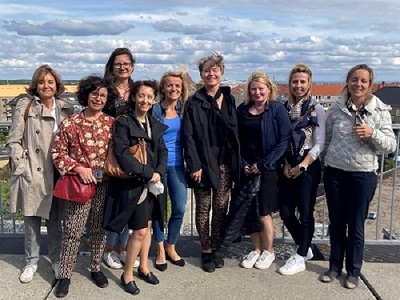
From right to left, Ana Carmen Saura Vinuesa (INE-Spain) Kari-Dorte Krogsrud Jensen (Statistics Norway), Marika Pohjola (Statistics Finland), Nina Von Lachman Steensen (Statistics Denmark), Izabella Selwestruk (Statistics Poland), Cristina D’Alessandro (INSEE), Dorota Paraluk (Statistics Poland), Dominique Francoz et Valérie Mathey (INSEE)
Statistical cooperation with the Central Bank of West African States (BCEAO): notable outcomes
The article below provides a summary of the cooperation that has taken place between INSEE and the BCEAO since 2015, drafted by Mahaman Tahir Hamani, Director of Statistics at the BCEAO. In order to implement these actions, INSEE mobilised experts from the National Accounts, Short-term Statistics and Statistical Methods departments. In addition to the continuation of the work already under way, the new areas of collaboration planned for 2023 include the participation of the SSP Lab in the development of a strategy for the exploitation of big data at the BCEAO, and that of the Statistical Infrastructures and Registers department and the Inspectorate-General in the establishment of a referential database allowing for the unique identification of companies in all member countries..
The Central Bank of West African States (Ouvrir dans un nouvel ongletBCEAO) is the joint issuing institute for eight member countries of the West African Economic and Monetary Union (UEMOA), namely Benin, Burkina Faso, Côte d’Ivoire, Guinea-Bissau, Mali, Niger, Senegal and Togo. As part of its activities, particularly those concerning the definition of the monetary policy within the UEMOA, the BCEAO has established a tool for monitoring the economic situation within companies.
Keen to improve that tool so as to obtain economic indicators that meet international standards, on 6 February 2015, the BCEAO signed a cooperation agreement with INSEE. Since then, a work programme has been agreed every year on this theme, the implementation of which has brought about the conduct of numerous missions, visits and remote discussions.
The actions implemented since 2015 within the scope of that agreement have enabled the BCEAO to extend the coverage and improve the quality of its economic analysis and forecasting tools. The main indicators developed are published and can be viewed online on the BCEAO website, including in the Ouvrir dans un nouvel ongletMonetary Policy Committee report, the Ouvrir dans un nouvel ongletmonthly and quarterly statistical bulletins and in the BCEAO’s Ouvrir dans un nouvel ongletstatistical database de la BCEAO. The key achievements are :
- Extension of quarterly GDP output to demand elements. In 2014, the BCEAO put an internal mechanism in place to establish the quarterly gross domestic product of the UEMOA, based on the output approach. In order to comply with international standards, the partnership with INSEE has made it possible for the quarterly GDP output to be extended to demand elements since 2016, bringing about an improvement in the calculation of the indicator and the quality of the analyses. In particular, INSEE has provided the BCEAO with modules developed using the “R” free software environment that are dedicated to calibration calculations and correcting for seasonal variations and working days for the purposes of producing quarterly GDP indicators.
- Upgraded system for monitoring the economic situation. The Central Bank upgraded the system that it uses to monitor the economic situation in 2017. Within the scope of this work, the UEOMA’s Issuing Institute was able to draw upon INSEE’s expertise, which allowed it in particular to refine its procedure for updating the sample of companies, introduce new surveys (including the ICA-services marchands (market services turnover index)) and strengthen the framework in which existing surveys are conducted. In addition, drawing inspiration from INSEE’s notes d’informations rapides (rapid information notes), the BCEAO has set up a summary bulletin, published once a month, providing a general overview of the changes in the key economic indicators developed by the BCEAO.
- Establishment of methodological notes. Several methodological notes have been produced for internal use following on from information visits and training workshops led by INSEE experts. These include in particular the note concerning the adjustment for seasonal variations and working days (correction des variations saisonnières et des jours ouvrables – CVS-CJO), the note concerning the implementation of a tool for calculating business climate indicators within the UEOMA and the note concerning the establishment of an economic forecasting tool based on balances of opinion.
- Establishment of a system for monitoring the economic situation of households. In 2018, the BCEAO established a system for performing household surveys, enabling it to monitor the living conditions of households and their perception of the evolution of the economic situation, in addition to the system in place for companies. That survey was designed in the light of the technical advice received from INSEE with regard to the operational aspects of household surveys, in particular the consideration of a rotating sample system that will allow response rates to be kept at satisfactory levels.
- Development of online data collection platforms. With a view to modernising its economic monitoring system for companies and households, the BCEAO has developed two online data collection platforms for the purposes of performing its economic surveys, drawing inspiration from INSEE’s Coltrane infrastructure. The platform dedicated to household surveys has been operational since 2021.
Regional reports on the SDGs: a visit by the High Commission for Planning of Morocco to the Île-de-France regional office
Morocco is engaged in an advanced regionalisation project that will reinforce the role of the High Commission for Planning (HCP) at the local level. Seven regional databases have been set up since 2017, which form the basis for regional reports on the Sustainable Development Goals (SDGs). They will be rolled out across all 12 country’s regions by 2024.
With a view to discussing this subject, from 6 to 8 July, a HCP delegation visited INSEE’s Île-de-France regional office, which published an overview of sustainable development in Île-de-France, structured around the 17 SDGs. The visit took place as part of the EU-funded Hakama II project in which INSEE is involved and including a component focusing on strengthening the HCP’s regional offices. Of these, two are acting as pilots for the project: Tangier-Tetouan-Al Hoceima and Casablanca-Settat. The delegation for this visit was made up of the two directors who were piloting the projects within these two regional offices and the national coordinator of the HCP’s regional offices.
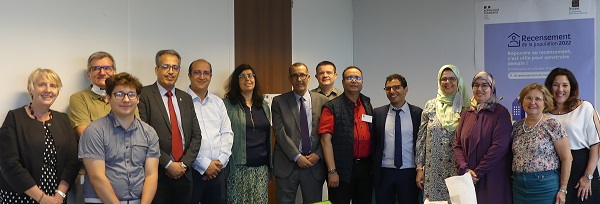
From left to right, Sylvie Druelle, Patrick Salvatori and Kevin Chaput (INSEE Ile-de-France), Zouhir Lahrizi (HCP Casablanca-Settat), Mohammed Addi, Tangier Regional Director (HCP), Isabelle Kabla-Langlois, Ile-de-France Regional Director (INSEE), My Abdellah Sougrati, regional offices coordinator (HCP), Ivan Tissot (INSEE Ile-de-France), Mohammed El Quarfaoui, Casablanca-Settat Regional Director (HCP), Mustapha Touahir (INSEE Ile-de-France), Fouzia Maaroufi and Nargisse Sakout (HCP), Marie-Odile Liagre and Nadia Boussad (INSEE Ile-de-France)
Interview with Isabelle Kabla-Langlois, Regional Director
How did this visit to the Île-de-France regional office play out?
The coverage of the indicators for the Sustainable Development Goals (SDGs) that each country is aiming to build, monitor and use to help to achieve these goals is extremely broad. The visit needed to address the reconciliation of the national and regional levels, the methodological issues surrounding the establishment of indicators at the local level, the partnerships at play within the regions and, finally, the way in which statistical production contributes to the achievement of the SDGs.
The visit therefore involved a packed schedule and highly varied discussions. The regional directors of Tangier and Casablanca explained the institutional context in which they were led to pilot the establishment of regional reports on the SDGs. For our part, we presented the indicators produced and disseminated by INSEE Île de France, referring to the module developed by the Auvergne-Rhône-Alpes Local Summary Regional Action Service Centre*, which presented its approach to the HCP representatives. We also sought input from the Pays de la Loire regional office, which performed pioneering work in this area, including a detailed characterisation of its territories according to the most prominent sustainable development issues.
A half-day was organised with the Regional and Interdepartmental Directorate for the Environment, Planning and Transport in Île-de-France, which produces a regional observatory, based largely, but not solely, on indicators produced by INSEE, and which drives public action at the local level around the SDGs. Education is one of the components of the SDGs, which led us to arrange a meeting with the Versailles local education authority. It goes without saying that the delegation was also given the opportunity to talk to the person in charge of the SDG programme at INSEE, Claire Plateau.
Did you find many similarities between the work that you have performed on the SDGs and that being performed by the HCP’s regional offices?
There were, of course, many similarities with regard to the approach. While INSEE is able to draw upon surveys and administrative data produced or used by the Official Statistical Service, its regional offices also make use of other supplementary data through their partnerships with regional stakeholders, which are sometimes better able to describe the local situation, particularly from an environmental point of view. The importance of knowing how to find and be able to use appropriate local sources, building partnerships at the regional level to access data, selecting the indicators that best fit the local situations and feed into local actions to promote the SDGs in a relevant way: these are all similarities in our approaches and the work we carry out.
The HCP’s regional offices have much in common with INSEE's regional offices, but there are also some differences, of an institutional and cultural nature in particular. In this regard, what do you think each side can bring to one another?
Regardless of such differences, international cooperation allows us to discuss how we approach certain needs or similar issues stemming from different situations, for example from the perspective of the existence or age of survey mechanisms, whether or not regional extensions of samples are used, how easy it is to access administrative sources, etc. We learn from our differences and from the questions that each entity asks itself. Describing our own collection mechanisms can prompt us to question certain choices, or even reclaim them by better understanding motivations that are, in some cases, rather old!
INSEE’s regional offices are increasingly involved in international technical support actions. What are your thoughts on this development?
This development undoubtedly echoes the decentralisation policies implemented in some of the countries that we work with or, in any event, responds to a more decentralised vision of public action. The fundamental roles of official statistics in describing phenomena in a detailed and robust manner, fuelling the local public debate, feeding into decisions and allowing for their evaluation are then at the heart of the technical support actions that we perform within the regional offices.
*Known as PSAR: pôles de services de l’action régionale. Located in the regional offices, they make investments that benefit the entire regional action network..
Changes within the International Technical Support division team
With effect from October 2022, Patrick Hernandez is the new head of INSEE’s International Technical Support division (division Appui technique international – DATI). Patrick held the position of productive sector statistics expert at AFRISTAT from 2001 to 2006. Between 2007 and 2022, he held positions linked to the analysis and dissemination of statistics at the local level within INSEE’s three regional offices: in Guadeloupe (2007–2011), in Île-de-France (2011–2016) and then in Nouvelle-Aquitaine (2016–2022).
He took over from Dominique Francoz, who had been in office since 2015. However, Dominique is continuing her international cooperation activities in her new role: she is now responsible for coordinating INSEE’s PAS2 subsidies and drawing up the medium-term programme 2024–2028 of the National Council for Statistical Information (CNIS). We would like to thank her and will continue to work with her within the framework of the Pan-African Statistics Programme.
In September 2022, Alice Tchang joined the team of national accounts experts, taking over from Jean-Samy Aziz, while Cristina D’Alessandro replaced Constance Torelli as head of statistical cooperation with sub-Saharan Africa.
Many thanks to Constance and Jean-Samy
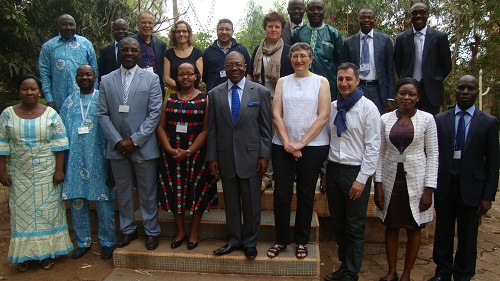
Constance Torelli (top, 6th from the left) and Jean-Samy Aziz (bottom, 7th from the left) during an ERETES workshop at AFRISTAT, December 2016, Bamako, Mali
In September 2022, Jean-Samy Aziz joined the Profiling and Processing of Large Units division within INSEE’s Business Statistics Directorate.
At DATI, Jean-Samy had been a key expert in the Ouvrir dans un nouvel ongletERETES national accounting application since 2013. Within the framework of the first Pan-African Statistics Programme (Ouvrir dans un nouvel ongletPAS1), he gathered recommendations from users in order to implement a new version of the application, which better meets the needs of the NSIs and their new projects with regard to national accounting. He drew up the specifications of this new version, which underwent IT changes within the framework of PAS2, and had it approved by the team.
In addition, Jean-Samy was heavily invested in the adoption of ERETES by the NSIs and its follow-up via numerous missions conducted over a period of nine years in North Africa (Algeria, Egypt, Morocco and Tunisia), West Africa (Côte d’Ivoire, Niger and Ghana), Cameroon, the Middle East (Palestine and Jordan) and Georgia. Finally, he brought his expertise to international seminars on the subject of national accounting held by numerous regional and international organisations, in particular organising several side events on the periphery of the side events on the periphery of the Ouvrir dans un nouvel ongletUnited Nations Statistical Commission.
“Palestine was a particularly significant success in my career, with the publication of three Supply and Use Tables (SUTs) with ERETES for 2017 covering the West Bank, Gaza and all of the Palestinian territories,” he explains.
Constance Torelli retires at the end of 2022. She spent most of her career working as a statistician at INSEE, focusing on social statistics. Her varied career path saw her work in a number of different departments at the Institute, as well as externally as part of the DIAL team working on the economy and development statistics. Her move to Ouvrir dans un nouvel ongletDial sparked an interest in cooperation. Her skills then led her to join the International Technical Support division in 2009 as a Geographic Manager for sub-Saharan Africa.
As a result, she had the opportunity to work directly with statisticians from southern countries during this time and acquired techniques that she helped to implement, taking account of the realities on the ground. For example, she pursued her expertise in the field of employment and the informal sector in sub-Saharan African countries and during the European twinning with Tunisia between 2016 and 2018.
Her interactions with statistical institutions in the South, her knowledge of the network of statistical expertise and research, and even international expertise, have all contributed to the implementation of technical assistance programmes led by DATI. Successes include the annual seminars at CEFIL, around which she, together with AFRISTAT, was able to bring together participants from countries in sub-Saharan Africa and the Maghreb to discuss significant and always carefully chosen issues.
Finally, in addition to her activity in support of the two NSIs of the overseas territories (New Caledonia and French Polynesia), she remained invested in research, in particular as the joint editor-in-chief of the Stateco review, co-edited by INSEE, AFRISTAT and the IRD and covering the methodological work in Official Statistics, aimed at cooperation stakeholders.
Highly valued by all of her contacts, both within and outside INSEE, for her professionalism, diplomacy and humour, she fulfilled her demanding mission with dynamism and tenacity. All of her colleagues would like to wish her a happy retirement.
A summary of INSEE’s cooperation activities in the 2nd half of 2022
Regional Activities
-
Pan-African Statistics Programme (PAS2)
Fourth coordination meeting of consortium members
Mission in Copenhagen (Denmark)
September
Sub-Saharan Africa
- Central Bank of West African States (BCEAO)

Participation in training on the use of rotating panels
Videoconference
July
Strengthening of the economic monitoring system
Visit to the Directorate-General (Montrouge)
October
GDP aggregations
Presentation by Eurostat
Videoconferences
November
-
AFRISTAT
45th meeting of the Executive Committee
Visit to Brazzaville (Republic of Congo)
October
-
AFRICAN CAPACITY BUILDING FOUNDATION (Ouvrir dans un nouvel ongletACBF)
Visit by Mr Mamadou Biteye, Executive Secretary
October
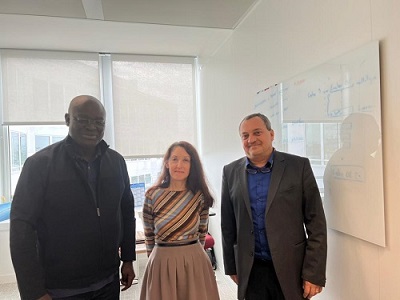
From left to right, Mr Mamadou Biteye, Executive Secretary of ACBF, Ms Cristina D’Alessandro, Programme Officer for Sub-Saharan Africa and Mr Patrick Hernandez, Head of the International Technical Support division (INSEE)
-
Projet DATAFID
Participation in the regional project to support the strengthening of digital economy statistics and the use of data science by tax and customs administrations (Ouvrir dans un nouvel ongletDatafid – Directorate-General for the Treasury)
Regional workshop in Abidjan (Ivory Coast)
December
-
IVORY COAST
Activity involving employment statistics within the framework of PAS2 (SOCSTAF)
Remote discussions
August-December
-
MAURITANIA
Drawing up of the bilateral agreement action plan with the National Agency for Statistics and Demographic and Economic Analysis (Ouvrir dans un nouvel ongletANSADE)
Mission in Nouakchott
September
-
NIGERIA, LIBERIA, SIERRA LEONE
ERETES presentation/training
Regional workshop in Abuja (Nigeria)
December
The Maghreb and Mediterranean Basin
-
ALGERIA
Inventory and drafting of a report for the purposes of rebasing the national accounts in the future
Office of National Statistics
Missions in Algiers
September and October
-
ALGERIA, TUNISIA
Implementation of a user satisfaction survey
Office of National Statistics (Algeria), National Statistical Institute (Tunisia)
Videoconference workshop
July
-
MOROCCO, TUNISIA
Webscraping training
High Commission for Planning (HCP), National Statistical Institute (Tunisia)
Mission to Rabat
December
-
MOROCCO
Ouvrir dans un nouvel ongletHakama II programme on European funding, 2020–2023
Boosting the capacities of the High Commission for Planning
1. Project management
Mid-term seminar
Mission to Rabat
July
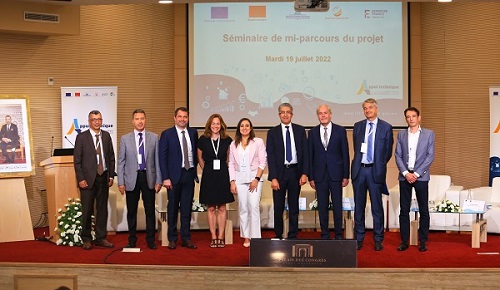
Participants in the mid-term seminar in Rabat, including Virginie Ma-Dupont, project leader (4th from the left, Expertise France), Mohammed Bircharef (6th from the left, HCP) and Olivier Gourdon (right, INSEE)
Steering Committee
Mission to Rabat
November
2. Strengthening the technical capacities of regional services
Governance – establishment of an organisational diagram for regional offices
Visit to the Directorate-General (Montrouge) and the Pays de la Loire regional office
(Nantes)
November
Governance – support for the gradual automation of data exchanges with local producers
Establishment of automated exchanges using the R software and training in this regard
Videoconferences, remote discussions, training in Rabat
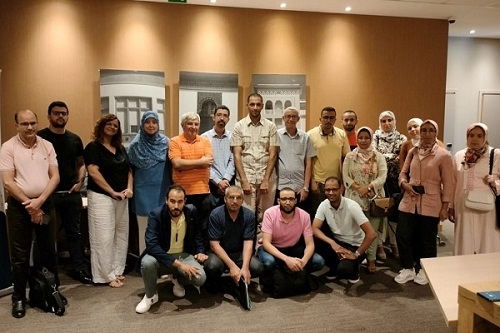
En 5th from the left, trainer Pascal Mercier (Lyon regional office, INSEE) and participants from the HCP at the R software training session in Rabat
Communication – improving and standardising publications
Drawing up of regional reports on the Sustainable Development Goals (SDGs)
Visit to INSEE’s Île-de-France regional office
July
3. Mixed-mode surveys
Establishment of a pilot employment survey conducted via telephone
Videoconferences, remote discussions, mission to Rabat
July–December
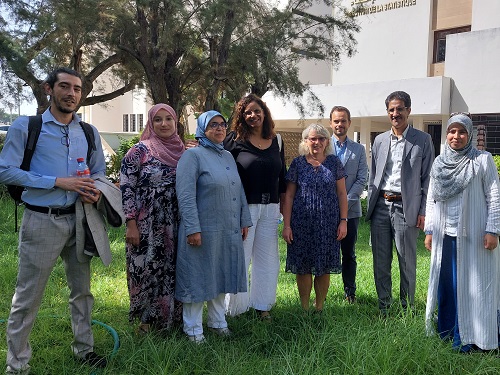
From left to right, Mr Mehdi Ataibi, Communications and Cooperation division, Ms Naima Labroude, Employment Surveys division, Ms Noura Zeddou, Statistical Information System division and Ms Hasnae Fdhil, Communications and Cooperation division (HCP), Ms Françoise Yaouancq, Île-de-France regional office (INSEE), Mr Simon Soustelle, deputy project lead (Expertise France), Mr Mahjoub Aaibid and Ms Salima Mansouri, Employment Surveys division (HCP)
-
TUNISIA
New Base 2 project: expansion of the new base to Tunisian national accounts
Videoconference and mission to Tunis
September


